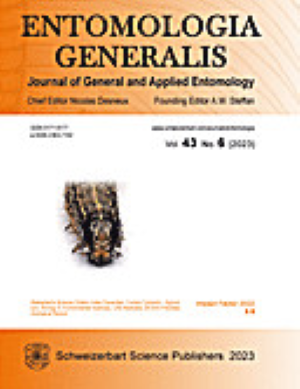在不同玉米品种上饲养的秋刺吸虫(Spodoptera frugiperda)的生命表与消耗率之间的联系
IF 4.6
1区 农林科学
Q1 ENTOMOLOGY
引用次数: 0
摘要
收集并分析了在甜玉米(SMJ)、腊玉米(WMJ)和青贮玉米(SMT)这三个栽培玉米品种上饲养的秋军虫(FAW)的生命表和叶片消耗数据,并采用年龄阶段、双性别生命表程序进行了分析。净消耗率(C 0)、净繁殖率(R 0)、内在增长率(r)、有限增长率(λ)和有限消耗率(ω)在 SMJ 上最高(C 0 = 155 cm2,R 0 = 211.1 个后代,r = 0.1494 d-1,λ = 1.1611 d-1,ω = 2.809)。在 SMT 上观察到的种群参数值最低(C 0 = 122 cm2,R 0 = 135.5 个后代,r = 0.1336 d-1,λ = 1.1429 d-1,ω = 2.625)。可以用几何回归法来描述各阶段的蚕网消耗率,从一个阶段到下一个阶段的消耗率增加 3 倍。由于玉米植株对害虫危害的易感性随其生长阶段而变化,因此有必要在幼苗期、花铃期和抽穗期分别设定害虫管理的经济阈值。在这项研究中,我们证明了利用计算机模拟可成功整合生命表数据、特定阶段的叶片消耗量和阶段结构,从而获得害虫管理程序的最佳时机。整合这些独立的数据集,对于制定合理的生态和经济虫害综合防治策略来控制 S. frugiperda 至关重要。本文章由计算机程序翻译,如有差异,请以英文原文为准。
Linking life table and consumption rate of the fall armyworm, Spodoptera frugiperda reared on different maize cultivars
The life table and leaf consumption data of the fall armyworm (FAW) (Spodoptera frugiperda) reared on three cultivated maize varieties, sweet maize (SMJ), waxy maize (WMJ), and silage maize (SMT) were collected and analyzed using the age-stage, two-sex life table procedure. The highest net consumption rate (C 0), net reproductive rate (R 0), intrinsic rate of increase (r), finite rate of increase (λ), and finite consumption rate (ω) were observed on SMJ (C 0 = 155 cm2, R 0 = 211.1 offspring, r = 0.1494 d-1, λ = 1.1611 d-1, and ω = 2.809). The lowest population parameter values were observed on SMT (C 0 = 122 cm2, R 0 = 135.5 offspring, r = 0.1336 d-1, λ = 1.1429 d-1, and ω = 2.625). The instar-net consumption rates can be described using geometric regression with a 3-fold increase rate from one stage to the next. Because the susceptibility of maize plants to pest damage varies with their growth stage, it is necessary to set separate economic thresholds for pest management at the seedling, bell, and heading stages. In this study, we demonstrated that the life table data, stage-specific leaf consumption, and stage structure could be successfully integrated using computer simulation to obtain optimal timing of pest management procedures. Consolidating these separate data sets is crucial in formulating a sound ecological and economic integrated pest management strategy to control S. frugiperda.
求助全文
通过发布文献求助,成功后即可免费获取论文全文。
去求助
来源期刊

Entomologia Generalis
生物-昆虫学
CiteScore
7.10
自引率
18.80%
发文量
72
审稿时长
>12 weeks
期刊介绍:
Its scope covers all aspects of basic and applied research dealing with insects and more broadly with arthropods inhabiting wild, agricultural and/or urban habitats. The journal also considers research integrating various disciplines and issues within the broad field of entomology and ecology.
Entomologia Generalis publishes high quality research articles on advances in knowledge on the ecology and biology of arthropods, as well as on their importance for key ecosystems services, e.g. as biological control and pollination. The journal devotes special attention to contributions providing significant advances (i) on the fundamental knowledge and on sustainable control strategies of arthropod pests (including of stored products) and vectors of diseases, (ii) on the biology and ecology of beneficial arthropods, (iii) on the spread and impact of invasive pests, and (iv) on potential side effects of pest management methods.
Entomologia Generalis welcomes review articles on significant developments in the field of entomology. These are usually invited by the editorial board, but proposals may be sent to the Editor-in-Chief for preliminary assessment by the editorial board before formal submission to the journal. The journal also considers comments on papers published in Entomologia Generalis, as well as short notes on topics that are of broader interest.
 求助内容:
求助内容: 应助结果提醒方式:
应助结果提醒方式:


